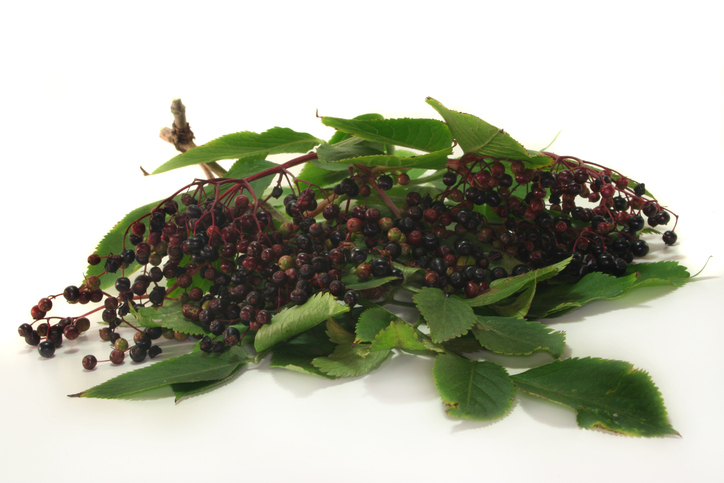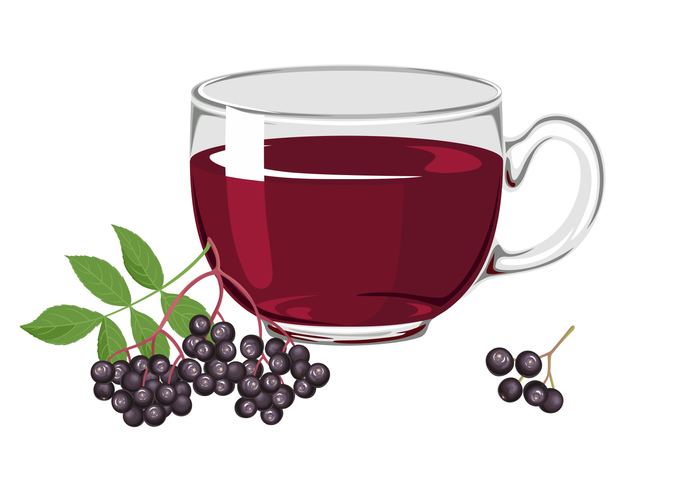Along With Toilet Paper, Elderberry Is Flying Off The Shelves. Here’s Why

Aside from toilet paper, hand sanitizer and disinfectant wipes, there’s another hot commodity in town these days due to the coronavirus pandemic - elderberry. (Elderberry is said to be one of the most popular medicinal plants in the world).
According to one report, siblings Nate Sylling and Diana Frazier each started their own elderberry syrup business back in late 2018.
Sylling and Frazier (who are based in Washington) got into the elderberry business, because they wanted to find a natural way to cut down on the number of times they and their families were getting sick each year. They had no clue that today their product would be in such high demand that they can barely provide enough product.
In addition to this, a kombucha shop in Texas keeps selling out of elderberry products, including elderberry gummies, syrups and concentrates, due to the coronavirus outbreak.
One news report claims that the shop started selling elderberry products about four years ago due to a “massive flu season that year.”

Basically, elderberry is a plant belonging to many different varieties of the Sambucus tree.
“They are important as garden shrubs, as forest plants, and for their berries, which provide food for wildlife and are used for wines, jellies, pies, and medicines,” (Encyclopedia Britannica).
“In folk medicine, elderberry has been touted as a remedy for stomach upsets, as an eye lotion, as a salve for bruises, and as a diuretic.”
The most common type is black (also called common) elderberry (Sambucus nigra).
The active alkaloids in elderberry plants are hydrocyanic acid and sambucine. Both of these cause nausea, so the fruit of the plant (the berries) must be cooked before they are consumed. The uncooked berries also contain cyanide-inducing glycoside (and, yes, cyanide is poisonous).
Just know that the stems, unripe fruit and leaves of black elderberry are all toxic to humans. But you probably won’t come across fresh elderberries in your local grocery store’s produce section, as you would blueberries or strawberries.
It’s more common to come across elderberry supplements in the form of syrups, gummies, teas, pills and lozenges. Black elderberry is praised for its ability to help fight cold and flu symptoms.
In one study, researchers administered oral elderberry syrup to treat influenza A and B. The study involved 60 patients (aged 18 to 54 years) who were experiencing flu-like symptoms for 48 hours or less. The patients were given either 15 milliliters of the syrup or a placebo syrup (the control group) four times a day for five days.
“Symptoms were relieved on average 4 days earlier and use of rescue medication was significantly less in those receiving elderberry extract compared with placebo. Elderberry extract seems to offer an efficient, safe and cost-effective treatment for influenza,” reports the National Institutes of Health (NIH).
Everyone is doing what they can to support their immune system.
So I suppose it makes sense why elderberry is particularly popular now that we are in the thick of this coronavirus outbreak. Everyone is doing what they can to support their immune system.
“Elderberry flowers contain flavonoids and rutin, which are known to improve immune function, particularly in combination with vitamin “C.” The flowers also contain tannins, which account for its traditional use to reduce bleeding, diarrhea, and congestion,” according to one source.
Elderberry tea is made by steeping the flowers of the elderberry plant. So the next time you are at the store, you might want to see if you can grab some elderberry tea.
Having a fever is an immune response.
Several sources say that the elderberry flowers help you “sweat out” a fever. A fever is the body’s response in fighting a virus or other type of infection. The virus does not give you a fever. It is an immune response.
“You get a fever because your body is trying to kill the virus or bacteria that caused the infection. Most of those bacteria and viruses do well when your body is at your normal temperature. But if you have a fever, it is harder for them to survive. Fever also activates your body's immune system,” according to the National Institutes of Health (NIH).
Another study found evidence which suggested that “...compounds from elderberries can directly inhibit the virus's entry and replication in human cells, and can help strengthen a person's immune response to the virus,” according to one report discussing the study.
Researchers of the study used commercially farmed elderberries that were made into a juice serum. This serum was then applied to cells before, during and after these cells had been infected with the influenza virus.
“The phytochemicals [plant compounds] from the elderberry juice were shown to be effective at stopping the virus infecting the cells, however to the surprise of the researchers they were even more effective at inhibiting viral propagation at later stages of the influenza cycle when the cells had already been infected with the virus.”
This does not mean that elderberry will have the same ability to fight the new coronavirus. It just shows that elderberry may help support our immune system as we fight this pandemic.
Antioxidants in elderberry (which give the fruit its dark purple color) may also have antiviral properties.
I do want to be very clear in saying that elderberry is not for everyone and you always want to seek the advice of a competent healthcare professional before you take any supplement. It is also important to note that many elderberry gummies, dissolvable tablets and other products contain zinc.
It is advised that pregnant or breastfeeding women do not take elderberry. Keep in mind that elderberry may also act as a diuretic. So if you are already taking medications that have diuretic effects, elderberry may not be something you should take.
This information is not definitive, however, it is important to note that one doctor in this report claims you should avoid elderberry when it comes to treating symptoms of the new coronavirus.
"When you are exhibiting symptoms of infection or test positive for coronavirus, you should consider avoiding elderberry, because the immune-activating properties of it may cause increased levels of IL-1B and/or IL-18 in infected immune cells. These are inflammatory cytokines that could potentially make the illness more complicated," claims Dr. Marvin Singh.
We really have to take in this information from all sides. Nothing is definitive, however, there are plenty of sources that say elderberry does contain antiviral and immune boosting properties. Again, the best thing you can do is consult a competent medical professional.
Finally, there are also many ways to help your immune system do its job as we fight this pandemic.
What are you doing to stay healthy? Please share.
Enjoy your healthy life!
The pH professional health care team includes recognized experts from a variety of health care and related disciplines, including physicians, attorneys, nutritionists, nurses and certified fitness instructors. This team also includes the members of the pH Medical Advisory Board, which constantly monitors all pH programs, products and services. To learn more about the pH Medical Advisory Board, click here.







